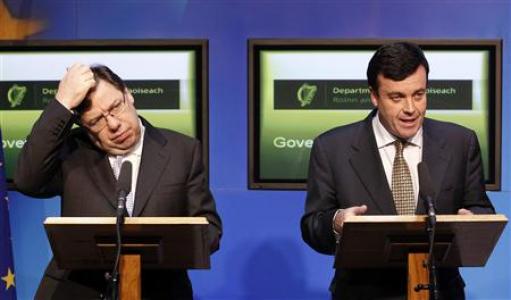Ireland set for nervy two weeks until budget vote
DUBLIN |
DUBLIN (Reuters) - Ireland begins two nervous weeks of political maneuvering on Tuesday as the government dares the opposition to block an austerity budget on which a multi-billion euro EU/IMF bailout is riding.
Irish Prime Minister Brian Cowen defied mounting pressure to quit on Monday, saying he would stay in office until parliament passed the budget, then call an early election.
Public anger at his handling of Ireland's economic and banking crisis has only grown since he announced the bailout, and his chances of passing the budget fell dramatically when two independent members of parliament said they were likely to withhold their support.
But Cowen said the national interest required that he press on to unveil a promised four-year austerity package on Wednesday, and a 2011 budget on December 7.

The government is expected to announce that it will cut the minimum wage, slash social welfare spending, reduce the number of public employees and add a new property tax and higher income taxes in a package intended to slash 6 billion euros off next year's budget, and 15 billion off the annual budget by 2014.
Trade unions have warned that the austerity plan could provoke civil unrest: a student demonstration over planned fee increases turned violent this month, and unions have organized a march to protest at the planned measures on November 27 in Dublin.

"DUTY TO BACK BUDGET
"We have entered into discussions with European partners on the basis that we are going to implement a budget that will have a 6 billion euro adjustment," Cowen told a news conference after emergency talks with his cabinet.
"We believe that there's a clear duty on all members of Dail Eireann (parliament) to facilitate the passage of these measures in the uniquely serious circumstances in which we find ourselves."
As EU and IMF negotiators thrash out details of the rescue package, Theresa Reidy, politics lecturer at University College Cork, said Cowen's Fianna Fail party seemed to be planning to cajole the opposition into abstaining on the budget.
"What we will see in the next fortnight is growing pressure on the opposition parties for the sake of political stability to abstain on the major votes," she said.
Both the main opposition parties, Fine Gael and Labour, who are likely to come to power in a coalition after next year's election, had demanded that an election take place before the budget, and seemed unlikely to fall in line soon, if at all.
"The taoiseach (prime minister) thinks he has a majority so let him go ahead and exercise his majority," said Fine Gael finance spokesman Michael Noonan.
"Do you seriously think he is looking for our support? I don't think so. I have no idea what's going to be in the budget ... There is a (Fine Gael) front bench meeting tomorrow and we will consider whether we will put down a vote of no confidence."
Analysts say most Irish people, who have endured two years of austerity and recession and now face four more years of cuts on foreign lenders' terms, would prefer an immediate election.
But some take a more pragmatic view.
"I don't think they should call an election before the budget because the whole basis of the IMF coming in would be undermined," said 39-year-old Dublin teacher Gerald Murphy.
FEAR OF CONTAGION
European partners and the International Monetary Fund agreed in principle on Sunday to rescue Ireland with an expected 80 to 90 billion euros in loans to try to stop its crisis continuing to undermine the value of Ireland's traded debt and that of countries with similar problems -- notably Portugal and Spain.
So far the market response has been feeble.
Geoffrey Yu, foreign exchange strategist at UBS in London, said Cowen had thrown down the gauntlet to the opposition.
"But if you are a euro zone bond investor are you going to take that chance?" he said. "They won't be very impressed, but will they see this as a reason to sell off aggressively? We are not so sure either.
Last May, news of a bailout for Greece slashed the yield on Greek 10-year government bonds by 4.5 percentage points, halving the premium that investors required to hold Greek debt rather than low-risk German debt.
But Irish government debt prices have barely reacted to news of the latest bailout. In late European trading, the benchmark Irish 10-year bond was yielding 8.34 percent, over 5.5 points more than the German equivalent.
Irish stocks closed down 1.49 percent on Monday, and Irish bank shares fell by about 20 percent on fears that equity holders will take the first losses.
Moody's Investors Service said a "multi-notch" downgrade of Ireland's credit rating, still leaving it in the investment grade category, was now the most likely outcome.
(Additional reporting by Jodie Ginsberg and Lorraine Turner in Dublin, Emilia Sithole-Matarise, William James and Fiona Sheikh in London; Writing by Kevin Liffey; )
